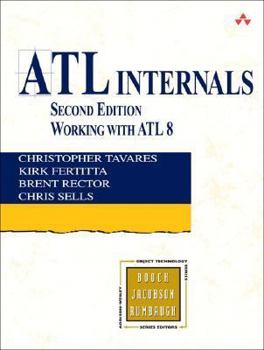ATL Internals: Working with ATL 8
(Part of the Addison-Wesley Object Technology Series Series)
Select Format
Select Condition 
Book Overview
This text seeks to address the real-world problems of how to develop commercial-quality OLE component objects. It is a how-to guide for OLE programmers, concentrating on the MFC methods that an OLE... This description may be from another edition of this product.
Format:Paperback
Language:English
ISBN:0321159624
ISBN13:9780321159625
Release Date:January 2006
Publisher:Addison-Wesley Professional
Length:858 Pages
Weight:2.88 lbs.
Dimensions:1.6" x 7.1" x 9.0"
Related Subjects
APIs & Operating Environments COM, DCOM & ATL Computer Science Computers Computers & Technology Languages & Tools Network Programming Networking Object-Oriented Design Programming Programming Languages Software Design & Engineering Software Design, Testing & Engineering Software Development Software EngineeringCustomer Reviews
1 rating
deals with many legacy issues
Published by Thriftbooks.com User , 18 years ago
Tavares and his co-authors present a specialised guide to the latest version of Active Template Library. It's for the C++ programmer on a Microsoft machine, who is also familiar with the Component Object Model. The authors specifically state that you really do need expertise in the latter. The book deals with various legacy issues, mostly dating back to MFC, which is now largely deprecated. But there are also other aspects that are grubby and mostly unavoidable. For example, when dealing with character types, there is an abstraction called OLECHAR. Under Win32, it maps to wchar_t, while under Win16 [and the Mac] it maps to char. The need for this was due to the hardware improvements that took us from 16 bit CPUs to 32 bits. A transition that occurred mostly in the 80s. But for Microsoft, the legacy code remains in use. So there has to be low level logic that maps the character type to an actual appropriately sized memory allocation. By the way, don't think this issue is confined to Microsoft. C code from that era that was developed for Unix machines, and which might still be in use, often has a similar problem. C macros dealing with this are a notorious source of porting errors. The text deals with many other aspects of ATL. Some, like collections and enumerations, are very cleanly done. These classes are inherently meant to be high level abstractions. And the C++ code examples that use these are very easy to follow. The discussion of this also includes some sample Visual Basic code. (Most of the book has C++ code.)





